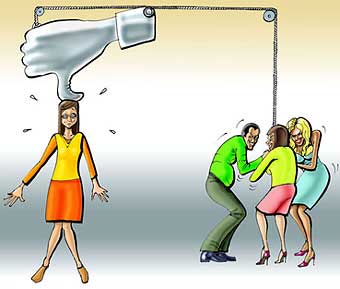HARASSMENT is also a form of discriminatory action against an employee.
The Polish definition of harassment has been determined by the Labor Code in art. 18 [3a] § 5, which provides: The manifestation of discrimination within the meaning of § 2 is also:

- action consisting in encouraging another person to violate the principle of equal treatment in employment,
- conduct whose purpose or effect is violation of the dignity or humiliation or humiliation of an employee (harassment)
This code structure of the definition of harassment focuses on protecting the dignity of an employee.
Treating harassment as discrimination in employment, apart from the employee’s humiliation, should also cause deterioration of the situation in which the molested employee finds himself in relation to other employees.
It is reasonable to quote the definition of EU HARASSMENT.
In its light, HARASSMENT means undesirable behavior, the purpose or effect of which is to violate dignity and create an intimidating, hostile, degrading, humiliating or offensive environment.
In such a situation, for a given behavior to appear to resemble mobbing and to be considered MOLESTING, the following conditions must occur:
- the behavior must be offensive and subjectively unpleasant for the employee to whom it relates. An important element is the opposition expressed by the molested person.
- this behavior may be a one-off behavior. However, individual situations should not be considered harassment in which the employer or other employees behave in violation of the personal rights of the abused employee.
- they are deemed to violate the dignity of the employee by using objective criteria.
- the behavior is humiliating towards the molested employee and creates a climate of intimidation.
- arises from violation of the molested person’s rights in employment.
SEXUAL HARASSMENT is a special form of discrimination based on sex.
The Polish legislator introduced into the Labor Code this definition in art. 18 [3a] § 6, which reads as follows: discrimination based on sex is also any unacceptable behavior of a sexual nature or relating to the sex of the employee, whose purpose or effect is violation of the dignity or humiliation or humiliation of the employee: this behavior may consist of physical, verbal or non-verbal elements.
A feature of SEXUAL HARASSMENT is that it remains unacceptable and unwanted. SEXUAL HARASSMENT usually takes the form of:
- make suggestions,
- demanding or asking for sexual benefits,
- flirting, which can be offensive,
- raunchy allusions,
- make suggestions.
The Committee of Experts on compliance with ILO Convention No. 111 on Discrimination in Employment and Occupation has presented a report containing an example list of abusive behavior. Such behaviors are:
- innuendo,
- inappropriate comments about age, clothing, hairdo or family situation,
- insults and insults
- telling inappropriate jokes,
- inappropriate looks,
- presentation of pornographic content, etc.
It should be noted that the cited list of behaviors is an open catalog and it is unacceptable to classify each case of sexual harassment as a violation of the principle of equal treatment in employment on grounds of sex. It is only possible to classify such a situation if the perpetrator’s behavior (apart from fulfilling the statutory signs of sexual harassment) also fulfills the condition of unlawful differentiation of the employee’s situation.
SEXUAL HARASSMENT as a manifestation of discrimination based on sex can take two different forms:
- a form of creating hostile working conditions.
The perpetrator of this harassment may be the victim’s collaborator.
It consists in unwanted, unwanted sexual interest directly directed at a specific person, which negatively reduces the efficiency of work.
This form or „hostile environment” is expressed in two types of behavior:- unwanted sexual interest in behaviors such as:
- § sex jokes and comments,
- § comments on sex
- § showing sexually explicit material;
- harassment involving gender, manifested, for example, by:
- § insults
- § vulgarity
- § comments on gender-specific behavior,
- unwanted sexual interest in behaviors such as:
- a form of sexual blackmail
In this form, the perpetrator of sexual harassment can only be the employer or the supervisor as the only people who decide to employ employees and may be associated with the use of threats. This form is the only manifestation of sexual harassment as a manifestation of discrimination from due to gender, it directly affects the employee’s professional position. Blackmail in these conditions consists of demanding sexual reasons in exchange for employment for a job or for later maintaining a job.
EU standards of protection also include protection against SEXUAL HARASSMENT.
Directive 2002/73 / EC defines the term SEXUAL HARASSMENT in the light of which SEXUAL HARASSMENT is:
A situation in which unwanted sexual, verbal, non-verbal, physical behavior occurs with the purpose or effect of violating the dignity of a person and creating an intimidating, hostile, degrading, humiliating or offensive environment.
Protection against HARASSMENT AND SEXUAL HARASSMENT in the EU area is directly related to the concept of DISCRIMINATION due to gender, age, race, ethnicity, religion or belief, age, disability, sexual orientation which allows to fight these unexpected phenomena with legal instruments used to combat DISCRIMINATION.
COMPENSATION AND PENALTIES FOR SEXUAL HARASSMENT
As for the form of SEXUAL HARASSMENT in the form of creating hostile working conditions:
An employee who decides to go to court will be required to prove that sexual harassment has occurred.
In this case, the employer is liable only for his violation of the duty to respect the dignity and other personal rights of the employee, as determined by the Labor Code in art. 11 [1] and for not filling the safe working environment (Article 15 of the Code of Civil Procedure).
There is also no obstacle for the victim of sexual harassment to be able to act against the stalker pursuant to Art. 23 and art. 24 of the Civil Code to a civil court.
In the form of SEXUAL HARASSMENT type „hostile environment”:
The employee is entitled to claim damages before the court for violating the principle of equal treatment in employment (Article 18 [3d] of the Code of Criminal Procedure)
It also means that the employee shifts the burden of proof to the employer under appeal.
In such a situation, the employer will try to prove that the decision regarding the deterioration of the employee’s professional situation was caused solely by objective criteria, but did not constitute a consequence of the rejection by the employee of the proposal in a situation of sexual blackmail.
PROVISIONS CONCERNING HARASSMENT AND SEXUAL HARASSMENT:
- the act of June 26, 1974 Labor Code:
- of Art. 11 [1] [violation by the employer of the obligation to respect the dignity and other personal interests of the employee]
- of Art. 15 [failure by the employer to fill a safe working environment]
- of Art. 18 [3a]
- § 5 [a manifestation of discrimination within the meaning of § 2 is also:
- action consisting in encouraging another person to violate the principle of equal treatment in employment,
- conduct whose purpose or effect is violation of the dignity or humiliation or humiliation of an employee] (harassment)
- § 6 [discrimination based on sex is also any unacceptable behavior of a sexual nature or relating to the sex of the employee, whose purpose or effect is violation of the dignity or humiliation or humiliation of the employee: this behavior may consist of physical, verbal or non-verbal elements] (sexual harassment)
- § 5 [a manifestation of discrimination within the meaning of § 2 is also:
- the act of April 23, 1964 Civil Code: art. 23 [protection of personal rights] art. 24 [infringement of personal interests]
- Directive 2000/43 / EC
- Directive 2000/78 / EC
- Directive 2002/73 / EC

